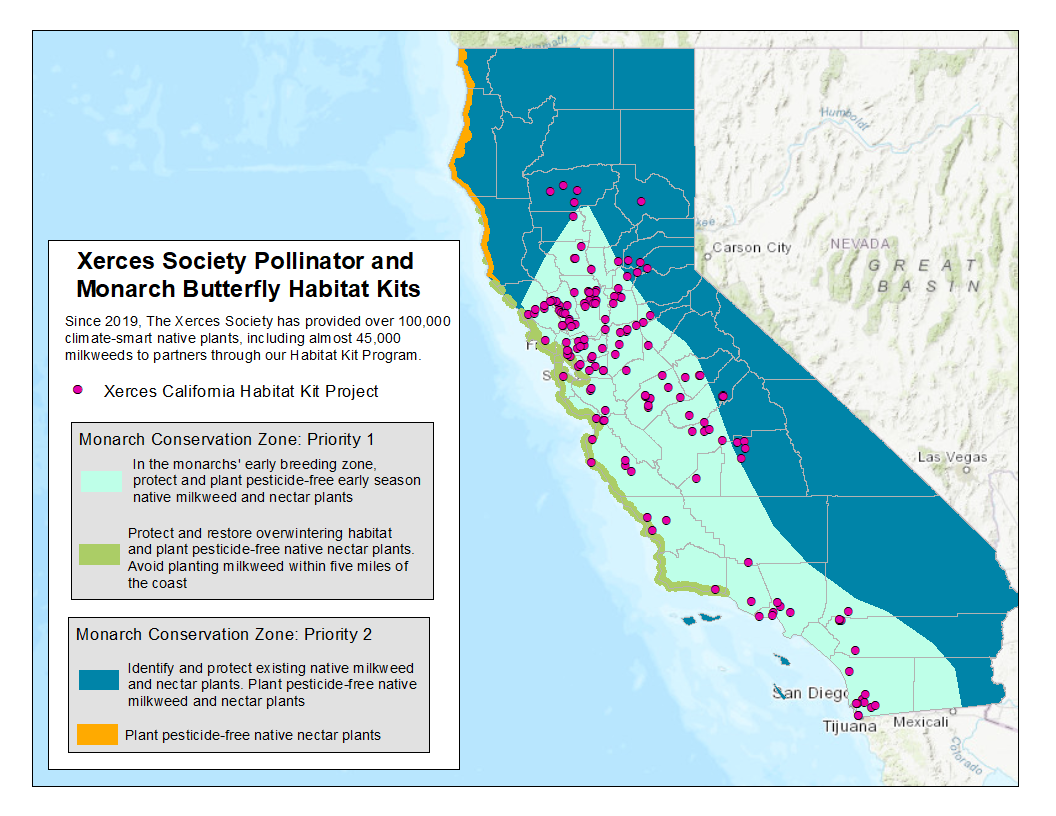The Xerces Society gives away 34,690 native plants in habitat kits to partners who are creating habitat for pollinators and monarch butterflies.
Expert Contacts
Angela Laws, Endangered Species Conservation Biologist, Xerces Society for Invertebrate Conservation
[email protected] | (785) 236-1118
Jessa Kay-Cruz, Senior Pollinator Conservation Specialist, Xerces Society for Invertebrate Conservation
[email protected] | (530) 510-0976
SACRAMENTO, Calif.; Tuesday, October 26, 2021---This week, the Xerces Society is distributing more than 34,000 native plants in habitat kits to community partners around California to restore habitat for monarch butterflies and other wild pollinators. This initiative provides community partners with free native plants and technical support to directly address the loss of habitat that is one of the major factors causing declines in populations of monarch butterflies and other pollinators.
Over the last two years, the Xerces Society’s habitat kit program has provided native plants and technical support to over 140 organizations and landowners in California. Including the kits being given out this week, Xerces has distributed more than 105,000 climate-smart native plants, including nearly 44,000 native milkweeds. These plants have been used to create habitat in working lands and natural areas, as well as pollinator gardens in cities and towns around the state.
Xerces’ habitat kit program grew from a desire to accelerate their habitat restoration work in response to catastrophic declines in the western monarch population in recent years. The western monarch population has declined 99.9% since the 1980s, when an estimated 4 million butterflies overwintered along the California coast. By last winter, that number had dwindled to less than 2,000 butterflies. And monarchs aren’t the only pollinators in trouble. The western bumble bee, Crotch’s bumble bee, and many other species of pollinators in California are also in need of conservation efforts, due to threats including habitat loss, pesticides and climate change.
Migratory western monarchs are being reported at their overwintering sites in coastal California in greater numbers than last year, with hundreds at some sites and thousands at others, giving hope for the struggling population. These welcome reports are a reminder that there is still time to act to protect monarchs.
“Restoring pesticide-free habitat is one of the primary ways we can support monarchs and other pollinators” says Angela Laws, Endangered Species Conservation Biologist with the Xerces Society. “After the western monarch population crashed, we realized that one of the most efficient ways to help monarch butterflies recover was to support people who manage land and are already interested in restoring it to support these pollinators.”
Often, the ability of landowners or land managers to do restoration work is hampered by the costs of native plants or by uncertainty about which plants to use. The Xerces Society habitat kit initiative seeks to address these issues by providing regionally appropriate native plants to partners interested in creating pollinator habitat in working lands or public spaces.
“The response of our partners has been amazing,” said Jessa Kay Cruz, Senior Pollinator Conservation Specialist with the Xerces Society. “They provide the places kits can be planted, and their hard work has resulted in acres and acres of high quality habitat for monarchs and other pollinators.”
“We are happy we can support so many great projects,” Cruz added.
A majority of the habitat kits projects fall within the most important places to restore habitat for migratory monarchs in the western U.S. This priority restoration zone is the area where the first generation of monarchs breed in the spring, and is the highest priority for improving monarch habitat, including the planting of native milkweeds and nectar plants.
The Xerces Society’s habitat kit initiative has proven to be very successful and there are now similar programs in the northeastern United States and Santa Fe, N.M. We are anticipating that habitat kits will be available in California again next year. Check out xerces.org for more information.
###
Western Monarch Call to Action: https://xerces.org/western-monarch-call-to-action
Most recent reports of monarchs returning to overwintering sites in California: https://xerces.org/press/early-signs-of-hope-as-monarch-butterflies-return-to-california-overwintering-sites
Learn more about the Western Monarch Thanksgiving Count: https://www.westernmonarchcount.org/
ABOUT THE XERCES SOCIETY FOR INVERTEBRATE CONSERVATION
The Xerces Society for Invertebrate Conservation protects the natural world by conserving invertebrates and their habitat. Established in 1971, the Society is a trusted source for science-based information and advice and plays a leading role in protecting pollinators and many other invertebrates. Our team draws together experts from the fields of habitat restoration, entomology, plant ecology, education, community engagement, pesticides, farming and conservation biology with a single passion: Protecting the life that sustains us. To learn more, visit xerces.org or follow us @xercessociety on Twitter, Facebook or Instagram.
The following images are released for media use.
To download, right-click on image and select "save."
Description: Map showing the locations where habitat kits provided since 2019 by the Xerces Society have been planted. The majority are within the highest priority zone for recovering monarch butterflies.
Photo credit: Xerces Society
File name: CAhabitatkit-plantinglocationmap_XercesSociety

Description: Students at San Joaquin Delta College in Stockton, California, create a pollinator garden at the college using a habitat kit provided by the Xerces Society. The college received a kit in 2020.
Photo credit: Xerces Society / Deedee Soto
File name: CAhabitatkit_IMG_5313_XercesSociety-DeedeeSoto
Description: Volunteers with the California Native Plant Society work to plant over 1,500 native plants provided by the Xerces Society. The native plant society received a kit in 2019.
Photo credit: Nurit Katz
File name: CAhabitatkit_DSCN7338_NuritKatz
